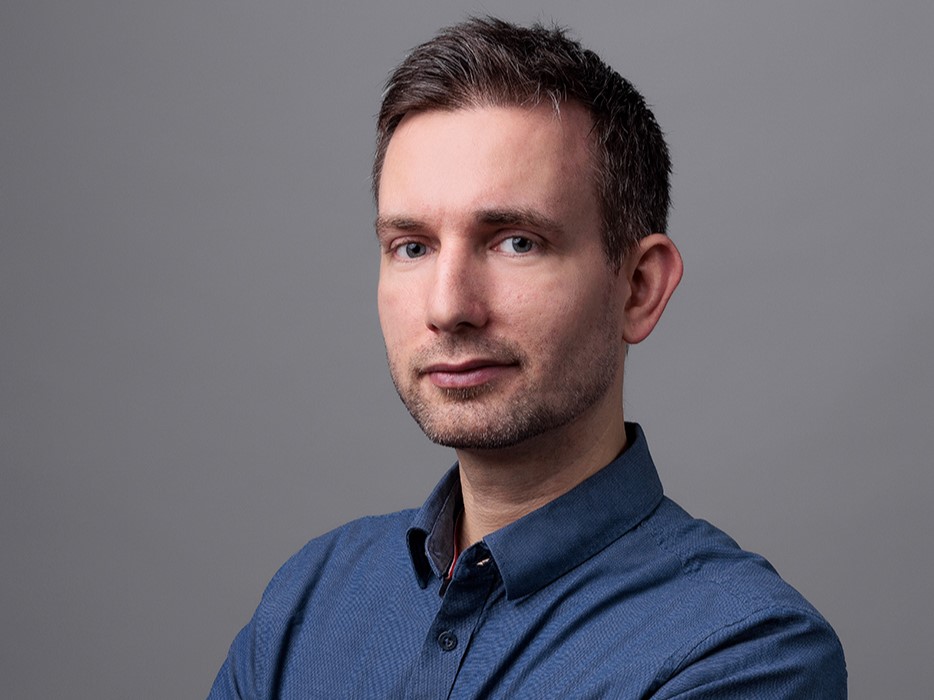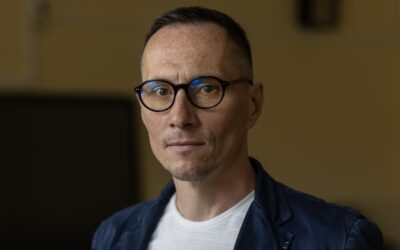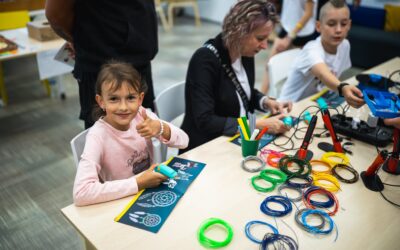Psychologist Križo: You need to know how to take care of yourself. If the teacher is not cool, the children will detect it
Viktor Križo from Inklucentro considers informal education of children aged 11 to 15 very useful and beneficial. And not only for them, but also for the adults who work with them. It’s a challenge, hard work at times and takes a lot of patience, but it’s worth it! We talked about the problems of education in Slovakia, ways of solving conflicts, and the importance of informal education.
We conducted the following interview as part of our bootcamp, where Viktor Križo was a lecturer. He confirmed to us that the development of soft skills can fundamentally help children later in adulthood. He jokingly remarked that companies don’t need people who can divide by three digits. They need people who can react to changes and are flexible.
Open Future program covers the informal education of children between the ages of 11 and 15, i.e. the period of puberty. What do you see as the biggest challenges when working with this age group?
The one who works with children of this age must first of all be well anchored in himself. Youth at this age can easily reveal all the dark, unprocessed things that a person carries inside. If I have a problem with noise or I’m shy, this feature of mine will be fully manifested. I will be nervous, I will feel stressed. You need to know yourself well and be able to prevent certain things.
It is teachers at the second level who most often burn out. They are numb to children, they automatically see them as criminals and fagans. In short, they forgot to arm themselves. Working with children at this age is like going to the front. You have to be strong and have “enough weapons” in a good way. You need to know yourself really well in the context of relationships with children. Then the pedagogue is able to handle the load, react in time, not push so many things into the background. Otherwise, a person comes home from school or a club devastated by children, does not sleep well.
On the contrary, if a person is anchored in himself, he will find that working with young people of this age is extremely rewarding. When working with youth, you are “exposed to fire”. You have to be firm. When it happens that work is destroying me, it is important to have a mentor, supervision, so that one does not burn out. Finding my place, setting my own rules and being able to take care of myself – that’s the oxygen mask on the plane that I put on myself first and then I’m able to help others.
In one of the interviews, you highlighted the benefit of the morning circle in teaching. At the same time, the meaning of a simple question from a teacher: How are you? What is the hidden power of such elements when working with youth?
Since the teacher spends years together with the children, there is a very close relationship between them. It doesn’t have to be just about the question How are u?, because the teacher already sees many things. But he can notice what is happening in the class and bring it as a topic right into the morning circle. I will give an example: I noticed yesterday that you had a hard day, you had more papers, so I wanted to hear how you managed it. This sentence shows the teacher’s interest.
Can I ask a question How are u? in a way that makes it clear that I don’t even care about the answer, that the question is one of many formal activities for me. Well, I can also ask in a way that expresses deep interest. Once, in the morning circle, I started talking about an event that happened the day before at the Christmas markets in Berlin. There was a terrorist attack where a man drove his car into a crowd of people. Many students caught this information in the evening news. I brought the photos. I explained to the children that I was interested in how they felt about it. The goal was not to solve a problem, but to create an interaction. I sparked a debate through a specific topic that was topical. We experienced together the informality of that conversation, for example compared to the kind of mathematics where they open a workbook and calculate.
The time a parent or teacher talks to a child is real relationship building. With an interest in the child, who hears what I experience, says what he experiences – the experience is shared. Therefore, more such informal moments should be introduced in schools, for example through morning circles. When there’s a fight in class, I’m not going to make a mental face then discuss this with the class teacher. I can react immediately so that the children understand that I am interested in the situation and that it bothers me.

V of our primary and secondary schools are getting bigger and bigger of course so called helping professions, for example the presence of psychologists. What do you think is their greatest importance?
Before my stay in Norway, I thought that helping professions existed to support children. However, when I experienced the Nordic countries, I understood that helping professions are not only for children, but perhaps even more important for adults, for teachers or parents. It is the teachers who are supposed to be real relational persons for children, with whom they spend every day and form a community.
Creating external relations between psychologists and children is not an ideal model. Psychologists are in the school like supporting pillars that hold up the building. But they are not part of that building directly, their job is to make it work inside. In Slovakia, we need to move from the fact that a psychologist works with 23 children per week and has one child every hour. We have gaps here. If a psychologist has his or her own office, sits in it and carries out his work from it, it will have the same effect as coming to Africa with a basket of bread and randomly giving it to children. Such an approach builds a system, a safe environment.
Psychologists need much more than just doing individual intervention with children. They should support teachers in making their assessments less stressful. They should also set up such a climate in the school that the interpersonal relations between the pedagogical community, the principal and the children are supportive.
Within the curriculum of the Open Future program we develop in children in the second grade elementary school soft skills, entrepreneurship or digital skills. They present their own projects, learn to work together in a team. Our professional guarantors andguarantor confirmed to us that these very skills to students and students after graduation elementary school missing. How to approach this debt across the board?
It would be great if programs like Open Future influenced education in our country. I think it is important that we also influence the system through such programs. A school in which an informal after-school program is present can gradually become infected with that way of working in a good sense of the word. It develops children’s critical thinking in practice. I think that the state is currently working carefully on this, but it does not have the know-how. Such programs as Open Future have know-how. Let’s not forget that companies don’t need people who can “divide by three digits”. They need people who can react to changes, are flexible.
This is something that we do not give children in our schools at all. The entire lesson is planned from A to Z. There is no room for anything to go wrong. Something will go wrong anyway, but when it does, we can’t react. We punish the student, give a note, and move on. We do not develop soft skills at all, and these are exactly what the child will need later in life and in business.
How pedagogues shouldstep up in developing soft skills? They don’t always have it easy in the classroom, there will be conflicts, sometimes one wants to raise one’s voice.
It’slike learning English. First of all we go through grammar, we learn vocabulary within topics such as family, transport, city and others. If you would however the children learned vocabulary from, for example, cookingand so that the teachers would cook with them for a week, they will be able to do it much more naturally. It’s the same with soft skills. Itwouldbe ideal for teachers or educatorsto adoptexiu či themthrough reflection or mentoring.
How does such learning take place?
First, I will try to respond to a certain situation with children that happened. I may not react in the most appropriate way, but I will come back to my reaction later. I reflect on what I said and did and how the children reacted to it. Which of my behavior they did not respond well to, which on the contrary worked. I learn as I go using soft skills. We have to work with feedback. Try it, don’t be afraid of change or failure. Maybe I’ll turn myself into an ox, so what?
If I react terribly in a situation, don’t be afraid to admit it in front of the children, for example,I saw your reaction when I said this, it probably didn’t make sense to you. Sometimes it happens that I say something artificially and the child feels that we are playing psychologist here. It’s like developing a product in the corporate sector. At the end of the day, it’s not perfect. It’s about trying something, we’re curious about feedback. We see how people react to the product and fine-tune it accordingly.
Viktor Križo
He studied mathematics teaching, special pedagogy, theology and psychology in Bratislava, Trnava and Brno. At this time, he is also engaged in PCA psychotherapy training. He worked as a mathematics teacher and special education teacher for twelve years. He currently works as a psychologist and therapist at the Counseling and Prevention Center in Bratislava 3. He is a promoter of the concept of inclusive education based on the humanistic psychology of freedom and responsibility of C. Rogers, Maslow and the Nonviolent Communication model. He guarantees innovative education in the Inklucentre and teaches courses. In the Slovak Chamber of Teachers, he deals with the topic of democratization in schools.
Other news
We Have Launched a New Open Future Center in Prešov: Bringing a High-Quality Educational Program to Eastern Slovakia
Our opening event in Prešov was not just about cutting a ribbon at the newly renovated space at Važecká Primary...
Teacher of the Year Rasťo Očenáš from Sliač: Soft Skills Are the Child’s Operating System
Rasťo Očenáš teaches the first graders at elementary school and is not afraid to try new things with children....
We Are Launching a New Open Future Center in Prešov Soon
Our program knows no boundaries of regions or cities, and after Trnava and Zvolen, it also got a pass in the...



